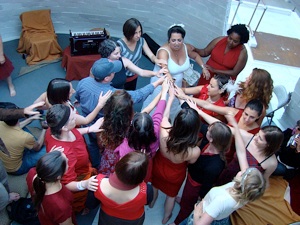

Babylon
The Apocalyptic Intimate











In late antiquity, Babylon was dense with supernatural beings. Seductive demons and fierce angels, jealous gods and powerful goddesses, all could be counted on to participate in everyday life, for good or for ill. These spirits could be coaxed and commanded with special combinations of letters, repeated words, biblical prooftexts and esoteric images. I work with ritual and amulets in the Jewish Babylonian tradition that draw on all of these elements.
Ritual and magic from late antique Babylon was a democratic form, used by every gender, age group, and income level. Even different religions shared the same magic culture—this magic is an urban, porous, cross-pollinating form. Jewish ritual from this time borrowed Mandaean, Syrian, Persian, or Greek divine names and demons; it referred to Zoroastrian, Gnostic and proto-Islamic beliefs and practices. Earlier Babylonian goddesses like Innana and Lamshtu often appear in Jewish practice; the character of Lilit originates in this mixed Mesopotamian crucible. The host of Babylonian demigods might be reframed as Y-h surrounded by angels. Babylonian magic became part of the root system of Kabbalah, known as Hekhalot and Merkavah literature. It is an interesting and powerful form, resonant with our lives today.
The most important protective element in this tradition is the incantation bowl, an amulet common from 300-700 CE in the area now known as Iraq. Incantation bowls, or demon bowls, are inscribed with a householder’s secrets and desires and then buried under the doorway to protect her home. These amulets were used to bring good health, easy sleep, love, lust, children, and prosperity to a dwelling-place. Divorce requests are common; oftentimes from people suffering from demons who married them non-consensually. Bowls may contain chants to exorcise spirits or draw in angels. A special delight of the bowls is to hear the individual voices of women from this time. These spiraled Aramaic inscriptions are among the few existing records of female voices during the time and place of the Babylonian Talmud.
The proper order and placement of words has power; ritual and amulet contain and direct that power, and strong surrounding spirits may choose to listen. Babylonian Jewish practice is an encounter with the world of the “apocalyptic intimate”--a spirit-rich environment where the vast supernatural realm intersects the tiny domestic sphere.













